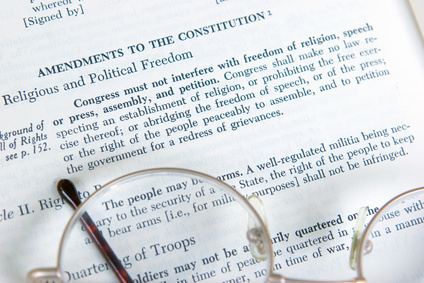A white nationalist super-PAC is ending its telephone campaign to urge Iowa voters to support Donald Trump in the February 1 caucuses, William Johnson told Bleeding Heartland today. Johnson is both the treasurer of the American National Super-PAC and one of three speakers on the robocall, which went out this past weekend. Bleeding Heartland posted the audio and call script here.
Speaking by phone today, Johnson estimated that he had spent about $5,000 on the calls. He said the order was placed to reach some 300,000 households, starting with residents of smaller Iowa towns and building up to voters in larger cities. Johnson said the campaign targeted landlines only, in order to comply with the law. He indicated that his group will not continue to place these calls or any other pro-Trump robocall before the Iowa caucuses, saying, “I didn’t want this to be a big issue.”
Johnson declined to elaborate further. I interpreted his comment to mean he intended to encourage Iowans to caucus for Trump but did not want his own advocacy of white separatism to become a controversy distracting from that goal. I suspect the “big issue” was probably unavoidable, since I am not aware of any precedent for a white nationalist group making independent expenditures to promote a leading major-party presidential candidate among a wide audience. Then again, I have not seen the Des Moines Register or other mainstream Iowa media covering this story, so perhaps Johnson had grounds to hope the American National Super-PAC’s support for Trump could fly below the radar. UPDATE: Ed Tibbetts wrote up the calls for the Quad-City Times; the Cedar Rapids Gazette and Sioux City Journal picked up his piece.
I have not been able to confirm how much Johnson spent on the robocalls, because his super-PAC has not filed independent expenditure reports with the Federal Election Commission. Johnson’s understanding is that such disclosure is not required, he told me today. That may be accurate, assuming the super-PAC spent less than $10,000 cumulatively, as Johnson states, and the expenditure occurred before January 12.
300,000 robocalls seems like a very large number for a state with a population of around 3 million. A source with experience running statewide campaigns in Iowa told me the estimate sounded reasonable, adding that $5,000 would certainly cover calls to at least 160,000 households, depending on the vendor, service, and technology used.
Johnson and Reverend Ronald Tan, another speaker on the robocall, had recorded an hour-long radio program to advocate for Trump’s candidacy. The episode of “For God and Country” was to have aired six times between January 12 and 22 on Des Moines-based KPSZ Radio, also known as “Praise 940.” Johnson forwarded his e-mail correspondence with a sales representative for the Des Moines Radio Group, which shows the company approved the program and sent a contract to Johnson on January 7. Johnson returned the signed contract the following day, indicating that a check for $2,100 was in the mail. Also on January 8, the white nationalist American Freedom Party announced the robocall and radio persuasion campaign.
Shortly after 10 am on January 11, the same representative for the radio group e-mailed Johnson, “Unfortunately, we’ve been advised by our attorney NOT to run the For God & Country program on KPSZ. If/when we receive the check for payment, we will return it uncashed.” I was not able to obtain further details from the Des Moines Radio Group about the attorney’s legal reasoning. Johnson emphasized that the Des Moines Radio Group had listened to the show and approved the content before sending the contract.
Asked whether the pro-Trump radio program may air on another station before the caucuses, Johnson said he contacted all of Iowa’s Christian radio stations, some 40 by his estimate. He is still waiting to hear back from one, which has not ruled out running the program. Some stations did not respond or refused to sell air time, either because they do not run programming containing advertising or because they did not approve of the commercials embedded in “For God and Country.” One of the ads promotes a school run by Mormons, and another promotes the Daily Kenn website. That site describes itself as a “conservative web site with an emphasis on anti-racism,” “including anti-white racism.” Battling pervasive “cultural Marxism” in our society, writers for the Daily Kenn focus on “black-on-white crime,” among other “signature issues.”
I will update this post as needed with details on any Iowa broadcast of “For God and Country.” Asked whether the American National Super-PAC will spend money urging New Hampshire voters to support Trump, Johnson said he set aside money for New Hampshire but was not sure now if he would spend it.
P.S.- Johnson identified himself as a “farmer and white nationalist” on the robocall. He told me today that he grew up on a cotton farm in Arizona and currently owns a stone fruit farm in California.






